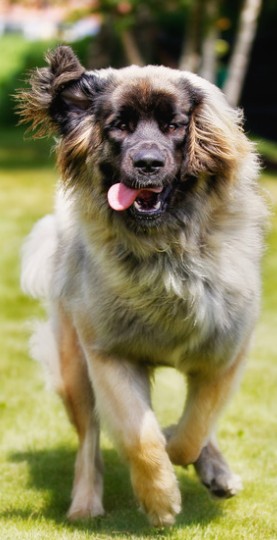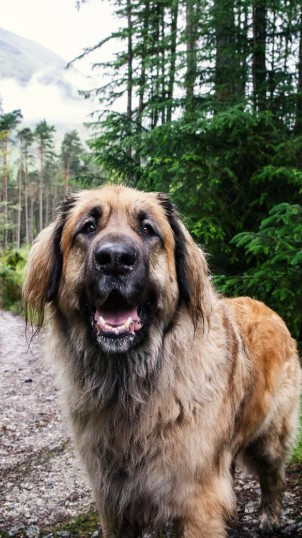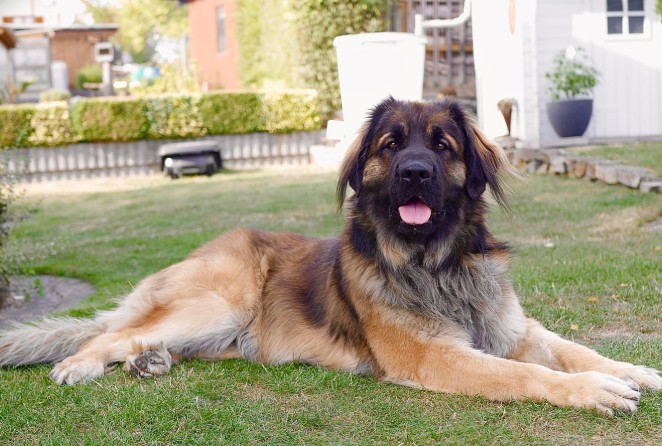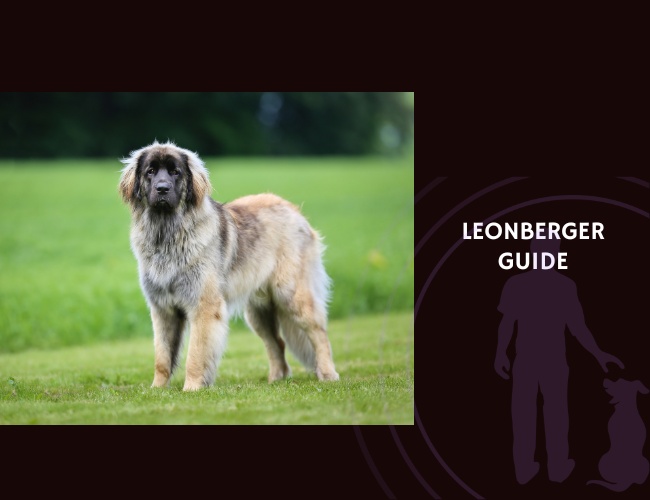Introduction: Meeting the Majestic Leonberger
Picture a dog with the gentle heart of a teddy bear, the protective instincts of a guardian, and the majestic presence of a lion. You’ve just imagined the Leonberger—a breed that captures hearts not through aggression or hyperactivity, but through their remarkable balance of power and gentleness. These gentle giants, affectionately known as “Leos,” represent one of the most emotionally intelligent breeds you’ll encounter.
Did you know that Leonbergers were originally bred in the 1840s in Leonberg, Germany, to resemble the lion on the town’s coat of arms? Today, they’ve evolved into something far more precious: devoted family companions who combine the best qualities of their founding breeds. Let us guide you through understanding these magnificent dogs, from their complex emotional nature to their specific care requirements.
Whether you’re considering adding a Leo to your family or simply want to understand these remarkable dogs better, you’ll discover why their combination of sensitivity, loyalty, and intelligence makes them both rewarding and challenging companions. Their journey from working dogs to therapy animals tells a story of adaptability and deep human connection that continues to define the breed today. 🐾
Character & Behavior: Understanding Your Leo’s Heart
The Guardian’s Gentle Soul
Your Leonberger possesses a fascinating duality that sets them apart from other giant breeds. These dogs demonstrate what researchers describe as being “self-assured, insensitive to noise, submissive to family members, friendly toward children, well composed with passersby, and self-disciplined when obliging its family or property with protection.” This means you’re living with a dog who can distinguish between genuine threats and everyday situations with remarkable accuracy.
What makes this temperament truly special is how your Leo expresses their protective nature. Rather than through aggression or territorial displays, they rely on their impressive size and calm presence to deter potential threats. You might notice your Leonberger positioning themselves between you and strangers—not aggressively, but purposefully, like a living shield of fur and devotion.
The breed’s behavioral consistency across different environments means you can trust your Leo to maintain their composure whether you’re at home, visiting friends, or encountering new situations. This reliability makes them exceptional family dogs, though their sensitivity means they’ll become visibly upset when witnessing family conflicts—a reminder that your gentle giant feels deeply.
Emotional Intelligence and Stress Response
Your Leonberger’s emotional sensitivity isn’t just a quirk—it’s a defining characteristic that influences every aspect of their behavior. These dogs possess an almost uncanny ability to read human emotions, which explains why they excel as therapy dogs. You’ll find your Leo responding to your moods before you’ve even acknowledged them yourself.
This emotional sophistication shows in their conflict resolution style. When situations become too intense, most Leonbergers won’t escalate with aggression. Instead, they’ll simply walk away, taking bad behavior in their stride. This emotional regulation requires early socialization to fully develop, but once established, it creates a dog who can navigate complex social situations with grace.
Under stress or environmental changes, your Leo’s sensitivity becomes even more apparent. While they maintain their friendly temperament, you’ll need to provide extra support during transitions. Their stress responses are surprisingly mature—rather than acting out, they tend to internalize anxiety, making it crucial for you to recognize subtle signs of discomfort.
Social Dynamics with Children and Other Pets
Living with a Leonberger means witnessing extraordinary gentleness, especially with children. Your Leo will show remarkable restraint and calm behavior around kids, though supervision remains essential. Their enthusiasm during play can lead to accidental knockdowns—imagine a loving, furry linebacker who doesn’t quite realize their own strength!
The inter-species socialization capabilities of Leonbergers prove impressive with proper introduction. You’ll find your Leo can coexist peacefully with cats, smaller dogs, and even exotic pets when raised together. However, same-sex aggression between Leonbergers can surface, making it inadvisable to keep two Leos of the same gender together.
Their approach to other animals reflects their overall temperament: confident but not aggressive, interested but not predatory. This balanced approach means multi-pet households can work beautifully, though you’ll need to manage introductions carefully and respect your Leo’s need for personal space.
Training & Education: Shaping Your Gentle Giant
Motivation and Learning Style
Understanding how your Leonberger learns transforms training from a challenge into a partnership. These intelligent dogs respond enthusiastically to positive reinforcement, with research showing treats, praise, and play create the strongest learning connections. You’ll quickly discover that harsh methods not only fail but can damage the trusting relationship you’re building.
Your Leo’s intelligence coupled with their desire to please creates interesting training dynamics. They’re capable of learning complex commands and behaviors, but they also possess enough independence to question whether your request makes sense. This isn’t stubbornness—it’s thoughtful consideration, and respecting this aspect of their personality yields better results.
The key to motivating your Leonberger lies in making training feel like collaboration rather than domination. When you present learning as a fun activity you’re doing together, their natural eagerness to make you proud emerges. Special training treats can help maintain focus, but you’ll find verbal praise and physical affection equally powerful motivators.
Critical Early Training Priorities
Starting training early with your Leonberger puppy isn’t just recommended—it’s essential for your future safety and happiness. You have to be especially careful with training due to their eventual strength and size. A full-grown Leo who hasn’t learned proper leash manners can literally pull you off your feet, turning walks into wrestling matches.
Spatial awareness training deserves special attention. Your Leo needs to learn at a young age that taking care in their movements is crucial. This means teaching them to navigate around furniture, children, and smaller pets without relying on you to clear their path. Think of it as teaching a gentle giant to dance—every movement needs intention and control.
The window for easiest learning closes quickly with Leonbergers. The longer you wait to begin training, the more stubborn—and strong—your Leo becomes. Those adorable puppy antics become serious behavioral challenges when displayed by a 150-pound adult, making early intervention your best investment.
Managing the Adolescent Leo
Adolescent Leonbergers can test even experienced dog owners. These teenage Leos, full of energy and hormones, can be quite a handful for the first year or two. You might find your previously well-behaved puppy suddenly “forgetting” commands or developing selective hearing—this is normal but requires patience.
Destructive behavior often peaks during adolescence, particularly if mental stimulation falls short. Your Leo isn’t being bad; they’re expressing frustration and excess energy in the only way they know. Establishing a foundation of good behavior before adolescence helps you navigate these challenging months more smoothly.
Remember that Leonbergers generally mature by three years old, though they reach their full size around one year. This means you’ll have a physically adult dog with a puppy’s impulse control—a combination requiring consistent boundaries and endless patience. The good news? Once through adolescence, most Leos become the calm, dignified companions the breed is known for.
Working Activities and Mental Enrichment
Your Leonberger’s working heritage isn’t just history—it’s a blueprint for keeping them mentally satisfied. These dogs historically pulled carts, guarded properties, and performed water rescues. Today, you can channel these instincts through modern activities that provide similar satisfaction.
Cart pulling or drafting remains popular among Leo owners, with many dogs showing natural aptitude for this traditional work. You don’t need formal competitions; a properly fitted cart for neighborhood errands provides excellent physical and mental exercise. The key is ensuring your Leo’s joints are fully healthy before beginning weight-bearing activities.
Beyond traditional work, consider activities that engage your Leo’s problem-solving abilities. Nose work, tracking, and even therapy dog training tap into their cognitive strengths while strengthening your bond. A Leonberger with a job—even a pretend one—is a happy Leonberger. 🧡
Nutritional Foundations: Feeding Your Growing Giant
Puppy Nutrition: The Critical Foundation
Feeding your Leonberger puppy requires more precision than you might expect. Giant breed puppies like your Leo are extremely sensitive to calcium and phosphorus imbalances, which can cause serious developmental problems. You’ll need a high-quality, premium large breed puppy food specifically formulated with optimal mineral levels for controlled bone growth.
The calcium-to-phosphorus ratio in your puppy’s food directly impacts bone mineralization and joint development. Regular puppy foods contain mineral levels that can actually harm giant breed puppies, accelerating growth in ways that stress developing bones. This isn’t about limiting calories—it’s about providing the right nutrients at the right pace.
Your Leo puppy needs three to four smaller meals daily until they’re 5-6 months old. This feeding schedule prevents overwhelming their digestive system while maintaining steady energy levels. You might notice your puppy seems constantly hungry, but resist the urge to overfeed—excess weight during growth phases creates lifelong orthopedic problems.

Adult Feeding: Balancing Energy and Weight
Transitioning your Leonberger to adult food marks an important milestone in their development. The typical adult Leo needs about five cups of high-quality dry food daily, divided into two meals. However, this varies significantly based on age, activity level, and individual metabolism—you’ll need to adjust based on your dog’s body condition.
Obesity poses a serious threat to Leonbergers, worsening their predisposition to arthritis and other joint problems. You should be able to feel your Leo’s ribs with gentle pressure but not see them prominently. Their waist should be visible from above, creating an hourglass silhouette despite their fluffy coat.
Many owners successfully feed varied diets including high-quality grain-free kibble, raw meat and offal, raw bones, fruits, and vegetables. This variety mimics natural canine diets and provides nutrients in their most bioavailable forms. Whatever approach you choose, consistency and quality matter more than following trends.
Bloat Prevention: A Life-Saving Protocol
Gastric dilatation-volvulus (GDV or bloat) represents one of the most serious threats to your Leonberger’s life. This condition, where the stomach fills with gas and potentially twists, requires immediate emergency surgery. Many Leo owners choose preventive gastropexy surgery, which tacks the stomach in place to prevent twisting.
Recognizing bloat symptoms could save your dog’s life. Watch for unsuccessful vomiting attempts, foaming at the mouth, severe discomfort with inability to lie down, and arching of the back. These signs demand immediate veterinary attention—every minute counts when dealing with bloat.
Prevention strategies become part of your daily routine. Feed your Leo at least twice daily, avoiding single large meals. Never exercise vigorously or create stress for at least one hour before and after feeding. Elevated feeders, once recommended, may actually increase bloat risk—current research suggests feeding at floor level.
Supplements and Special Dietary Considerations
Supporting your Leonberger’s joints and heart through nutrition requires strategic supplementation. Many giant-breed formulas already contain glucosamine and chondroitin for joint health, but additional supplementation might benefit older or working dogs. Omega-3 fatty acids from fish oil can reduce inflammation and support coat health.
Heart-healthy ingredients deserve special attention given the breed’s susceptibility to dilated cardiomyopathy. Look for foods containing taurine and L-carnitine, nutrients that support cardiac function. Some owners add these supplements separately, especially if feeding grain-free diets which have been linked to cardiac issues in some dogs.
Your Leo’s digestive sensitivity means dietary changes should happen gradually over 7-10 days. Sudden switches can trigger gastric upset or diarrhea, particularly stressful in giant breeds. Keep a consistent feeding routine—Leonbergers thrive on predictability in their meal schedules.
Health Management: Understanding Breed-Specific Challenges
Polyneuropathy: The Genetic Challenge
Leonberger polyneuropathy represents a complex group of inherited neurological conditions that every owner must understand. Three major genetic variants affect the breed: LPN1, LPN2, and LPPN3, each causing similar symptoms through different genetic mechanisms. Your awareness of these conditions helps with early detection and breeding decisions.
LPN1, resulting from a deletion in the ARHGEF10 gene, typically manifests before age three in affected dogs. You might notice exercise intolerance developing gradually, followed by gait abnormalities like an exaggerated “hitched” step in the hind limbs. Dogs with two copies of the mutation (LPN1-D/D) will definitely develop symptoms.
LPN2 presents more unpredictably due to incomplete penetrance—dogs with the mutation may show symptoms as young as one year, later in life, or never at all. This uncertainty makes genetic testing crucial for breeding decisions. Watching for early signs like voice changes, breathing difficulties, or weakness helps catch the condition early when management strategies prove most effective.
Orthopedic Health: Hips, Elbows, and Beyond
Hip dysplasia affects approximately 25% of Leonbergers after 18 months of age, making orthopedic health a primary concern. Your Leo’s massive frame puts extraordinary stress on developing joints, requiring careful management throughout their life. Early intervention through proper nutrition, controlled exercise, and weight management significantly impacts outcomes.
Interestingly, research shows puppies under three months shouldn’t have access to stairs but should exercise on soft, moderately rough outdoor terrain. This specific combination decreases the risk of developing radiographically detectable hip dysplasia. Your puppy’s exercise should build muscle while protecting developing joints—think nature walks rather than repetitive fetch games.
The Leonberger breed now benefits from Estimated Breeding Values (EBVs), helping breeders reduce dysplasia incidence. If you’re purchasing a puppy, ask about parent hip and elbow scores. Living with an affected dog means managing pain, maintaining ideal weight, and potentially considering surgical interventions like total hip replacement.
Cardiac Concerns: DCM and Heart Health
Dilated cardiomyopathy (DCM) ranks among the most common causes of death in Leonbergers. Your Leo belongs to one of eleven breeds with the highest cardiac mortality rates, making heart health monitoring essential. Early detection through regular echocardiograms can identify changes before clinical symptoms appear.
Signs of cardiac disease develop subtly—decreased exercise tolerance, coughing (especially at night), rapid breathing at rest, or abdominal swelling. You might dismiss early symptoms as normal aging, which is why proactive screening matters. Annual cardiac evaluations after age two help catch problems when treatment options remain most effective.
If cardiac disease develops, modern medications can significantly improve quality of life and longevity. Your veterinary team might prescribe medications to strengthen heart contractions, reduce fluid buildup, or manage heart rhythm. The key lies in early intervention—waiting until obvious symptoms appear often means missing the optimal treatment window.
Cancer Risks and Prevention Strategies
Cancer affects Leonbergers at alarming rates, with hemangiosarcoma and osteosarcoma being particularly common. Your Leo has the second-highest osteosarcoma rate among all breeds at 1.48% annually. Understanding these risks helps you make informed decisions about screening and early detection.
Research reveals that male Leonbergers who develop bone cancer later in life had higher body weights during growth periods. This connection between growth rate and cancer risk reinforces the importance of controlled puppy nutrition. You’re not just preventing orthopedic problems—you’re potentially reducing cancer risk.
While you can’t eliminate cancer risk entirely, certain strategies may help. Maintaining ideal body weight, avoiding unnecessary chemical exposures, and providing antioxidant-rich nutrition all contribute to overall health. Regular veterinary examinations help detect masses early when treatment options remain most viable. Knowledge of your Leo’s genetic background through health testing also informs monitoring strategies.
Balanced. Sensitive. Majestic.
Power doesn’t mean pressure—it means presence.
Your Leonberger commands space not by force, but through emotional steadiness and quiet authority. This is a dog who guards without growling, who leads through calm observation, and who stands between you and the world with silent certainty.
They don’t react—they resonate.
Every emotional ripple in your home echoes through your Leo’s heart. Their empathy isn’t accidental—it’s hardwired. These dogs absorb conflict, respond to sadness, and walk away from chaos. It’s not aloofness; it’s emotional literacy beyond most human comprehension.



Teaching them isn’t training—it’s conversation.
The Leonberger learns not through command, but through connection. Harshness breaks trust, while partnership builds capability.
Exercise & Activity: Balancing Energy and Health
Daily Exercise Requirements
Your Leonberger needs 60-120 minutes of daily exercise, though this varies with age and health status. The UK Kennel Club recommends two hours daily for adult dogs, but you’ll find most Leos satisfied with less intensive activity. Think of exercise as quality over quantity—mental engagement matters as much as physical movement.
Young Leonbergers require carefully managed exercise to protect developing joints. The “five minutes per month of age” rule provides a starting point—a four-month-old puppy needs about 20 minutes of structured exercise twice daily. Free play in a safe environment doesn’t count toward this limit, as puppies naturally self-regulate during unstructured activity.
Adult Leos benefit from varied exercise routines combining walks, swimming, and play sessions. Swimming proves particularly beneficial, providing excellent cardiovascular workout without joint stress. Many Leonbergers adore water, making pool or beach visits highlight their week. Just remember their dense coat holds water, requiring thorough drying to prevent skin issues.
Seasonal Considerations and Heat Management
Your Leonberger’s thick double coat creates significant thermoregulation challenges in warm weather. These dogs evolved for cold climates, with their waterproof coat providing excellent insulation against snow and rain. Summer heat, however, can quickly become dangerous without proper management.
Never exercise your Leo during the heat of the day in warm climates. Early morning and evening sessions work best, with midday reserved for indoor rest. If you live somewhere warm, air conditioning isn’t a luxury—it’s essential for your dog’s safety. Always ensure access to shade and fresh water, even during short outdoor sessions.
Watch for heat stress signs: excessive panting, drooling, weakness, or reluctance to move. Your Leo won’t always recognize their own limits, especially when trying to please you. The breed’s stoic nature means they might push through discomfort until reaching dangerous exhaustion levels. Your vigilance prevents heat-related emergencies.
Mental Stimulation and Enrichment Activities
Physical exercise alone won’t satisfy your intelligent Leonberger. These dogs need mental challenges to prevent boredom and destructive behaviors. Puzzle feeders, scent work, and training sessions provide cognitive stimulation that tires them as effectively as physical activity.
Consider rotating enrichment activities to maintain novelty. Monday might feature a frozen Kong with hidden treats, Tuesday a “find it” game with kibble hidden around the house, Wednesday a new training trick. This variety keeps your Leo engaged while strengthening problem-solving skills. The mental workout often proves more exhausting than physical exercise.
Your Leonberger’s working heritage means they excel at having a “job.” Whether it’s carrying a backpack on walks, helping with yard work, or participating in therapy dog programs, purposeful activity satisfies deep instinctual needs. Even simple tasks like fetching the newspaper or carrying groceries make your Leo feel valued and important. 🐾
Living with a Leonberger: Lifestyle Integration
Space and Housing Requirements
Living successfully with a Leonberger requires honest assessment of your space. These aren’t apartment dogs—they need room to move comfortably without knocking over furniture or people. Your Leo can cover huge amounts of ground quickly, and their large feet can destroy a small suburban lawn in days of regular play.
Indoor space matters as much as outdoor access. Your Leonberger will want to be wherever you are, meaning every room needs to accommodate a dog who might weigh 170 pounds. Narrow hallways, steep stairs, and cramped living areas create navigation challenges and potential injuries. Think about your Leo’s tail alone—it’s a coffee table-clearing weapon when they’re happy!
Despite their size, Leonbergers aren’t suited to outdoor-only living. They’re sensitive dogs who require human companionship to thrive. A Leo isolated from family becomes destructive and depressed. Your giant companion needs to share your living space, making them true family members rather than property guardians.
Managing Separation and Alone Time
Your Leonberger’s deep bond with family creates challenges when you must leave them alone. These people-centric dogs can develop separation anxiety, especially without proper conditioning. Some Leos become destructive when left alone, not from spite but from stress and boredom.
With adequate exercise and mental stimulation, Leonbergers can tolerate up to eight hours alone, though this isn’t ideal. You’ll need to build this tolerance gradually, starting with brief absences and slowly extending duration. Providing engaging toys, comfortable resting spots, and sometimes calming music helps ease their solitude.
Consider alternatives to long alone periods: dog walkers, daycare, or working from home partially. Many Leo owners find their dogs happier with a consistent daily routine that includes predictable absence periods rather than irregular schedules. Your Leo can learn that alone time is temporary when it follows a pattern.
Transportation and Travel Realities
Before bringing home a Leonberger, consider your vehicle situation. These dogs need SUV-sized transportation at minimum—trying to fit a Leo in a compact car ranges from uncomfortable to impossible. Their size affects every aspect of travel, from finding pet-friendly accommodations to airline policies.
Air travel with Leonbergers presents particular challenges. Most are too large for cabin travel, and cargo hold travel carries risks many owners won’t accept. Road trips become your primary travel method, requiring planning for frequent stops and adequate space. Your Leo won’t curl up in a tiny corner—they need room to stretch and shift positions.
Even routine vet visits require transportation planning. An injured or elderly Leo who can’t jump into vehicles needs ramps or assistance. Emergency situations become more complex when your dog weighs as much as an adult human. Having a transportation plan before crises arise prevents dangerous situations.

Grooming and Maintenance Commitment
Your Leonberger’s magnificent coat requires significant maintenance commitment. Daily brushing prevents painful matting, especially in areas where fur rubs against itself—behind ears, under legs, and around the collar area. During shedding season, which occurs twice yearly, you’ll wonder how one dog produces enough fur to stuff a mattress.
Professional grooming every 6-8 weeks helps maintain coat health, though many owners learn to handle basic maintenance themselves. Nail trimming, ear cleaning, and teeth brushing add to your grooming routine. Your Leo’s size makes these tasks physically demanding—imagine wrestling a reluctant bear into a bathtub!
The grooming commitment extends beyond the dog to your home. Leonberger fur becomes part of your décor, seasoning for your food, and an accessory on all clothing. Powerful vacuums, lint rollers in every room, and accepting that “fur-free” is no longer achievable become part of Leo ownership. Consider it a small price for their companionship.
The Senior Leonberger: Golden Years Care
Recognizing Age-Related Changes
Your Leonberger’s senior years typically begin around age six or seven, earlier than smaller breeds. You’ll notice subtle changes first: slightly longer recovery after exercise, preference for softer bedding, or hesitation before jumping. These early signs signal the need for adjusted care strategies.
Cognitive changes may accompany physical aging. Your senior Leo might show confusion in familiar places, altered sleep patterns, or changes in social behavior. These symptoms don’t mean immediate decline—many seniors maintain good quality of life with appropriate support. Early recognition allows interventions that slow progression.
Regular veterinary assessments become increasingly important during senior years. Bi-annual examinations help catch developing problems early. Blood work, cardiac evaluations, and orthopedic assessments provide objective measures of your Leo’s health status. You know your dog best, but professional evaluation identifies issues you might miss.
Adapting Environment and Routine
Making your home senior-friendly helps your aging Leo maintain independence and comfort. Non-slip rugs on smooth floors prevent falls, while ramps eliminate the need for jumping. Raised food bowls reduce neck strain, though monitor for bloat risk. Every modification that reduces physical stress extends mobility and comfort.
Exercise routines require thoughtful adjustment. Your senior Leo still needs activity but with reduced intensity and duration. Swimming becomes even more valuable, providing low-impact exercise that maintains muscle mass. Multiple short walks often work better than single long outings. Let your dog set the pace—they’ll tell you their limits.
Comfort becomes paramount in senior care. Orthopedic beds support aging joints, while heated beds ease arthritis pain. Some owners find that massage, acupuncture, or physical therapy significantly improves their senior’s quality of life. These aren’t indulgences—they’re investments in comfortable aging.
End-of-Life Considerations
Leonbergers typically live 7-10 years, making end-of-life planning an unfortunate reality of ownership. Your Leo’s quality of life matters more than quantity—recognizing when medical intervention becomes burden rather than benefit requires honest assessment. Trust your instincts and your dog’s signals about their comfort and happiness.
The physical realities of caring for a declining giant breed demand preparation. A Leo who can’t walk independently needs special equipment and multiple people for movement. Home euthanasia often provides the most peaceful option, allowing your companion to pass in familiar surroundings without stressful travel.
Grief following the loss of a Leonberger can feel overwhelming. These dogs integrate so completely into family life that their absence creates a massive void. Allow yourself to mourn fully—the depth of grief reflects the depth of love shared. Many Leo owners find that honoring their dog’s memory through donation to breed health research or rescue organizations provides comfort. 🧡
Making the Decision: Is a Leonberger Right for You?
The Ideal Leonberger Owner Profile
Successfully owning a Leonberger requires specific qualities and circumstances. Physical capability tops the list—you must be able to handle a 100-170 pound dog who might not always cooperate. This means strength for restraint but also balance and confidence. Your Leo will sense and exploit any physical uncertainty.
Time availability proves equally crucial. Leonbergers thrive on attention and form incredibly strong bonds with their families. You can’t be a distant owner who provides food and shelter but little interaction. These dogs need present, engaged companions who make them central to family life. Consider whether your lifestyle accommodates a velcro dog who wants constant companionship.
Financial resources for Leonberger ownership extend beyond purchase price. Food costs alone can exceed $100 monthly, while veterinary care for giant breeds costs proportionally more. Emergency surgery for bloat might cost $5,000-10,000. Pet insurance helps but doesn’t eliminate financial burden. Budget realistically for routine and emergency care.
Lifestyle Compatibility Assessment
Your living situation significantly impacts Leonberger suitability. Ideal owners have large, fenced properties where Leos can explore safely. However, acreage alone doesn’t suffice—these dogs need human interaction more than space. A small home with devoted owners beats a mansion with absent ones.
Family dynamics matter tremendously. Leonbergers generally excel with children but require supervision due to size. Their sensitivity to family conflict means high-stress households don’t suit them. Every family member must commit to training and care—one person can’t manage a Leo alone. Consider whether everyone shares your enthusiasm for giant dog ownership.
Previous dog experience, especially with large breeds, helps immensely. First-time dog owners can succeed with Leonbergers but face steeper learning curves. Understanding canine body language, training principles, and health management gives you advantages. If you’re a novice, consider whether you’re ready for the challenge of a sensitive, powerful, and relatively short-lived companion.
The Rewards of Leo Ownership
Despite the challenges, Leonberger ownership offers incomparable rewards. These dogs provide devotion and companionship that touches your soul. Your Leo will celebrate your arrivals, comfort your sorrows, and share your daily life with enthusiasm and grace. Their emotional intelligence creates bonds deeper than typical pet relationships.
Living with a Leonberger means joining a community of dedicated owners who understand the breed’s special nature. Leo people share training tips, health information, and emotional support through the unique journey of giant breed ownership. You’ll find yourself part of an international family connected by love for these remarkable dogs.
The relatively short lifespan of Leonbergers intensifies the ownership experience. Knowing your time together is limited makes every day precious. You’ll learn to appreciate small moments: morning greetings, evening cuddles, walks where strangers stop in amazement. Your Leo teaches you about living fully in the present—perhaps their greatest gift.
Conclusion: Your Journey with a Gentle Giant
Choosing to share your life with a Leonberger means accepting both tremendous rewards and significant responsibilities. These aren’t dogs for everyone—they require space, time, financial resources, and emotional commitment that exceed typical pet ownership. You’ve learned about their health challenges, training needs, and lifestyle requirements that make them suitable for only dedicated owners.
Yet for those who can meet their needs, Leonbergers offer something extraordinary. You’ll gain a companion whose emotional intelligence and devotion transcend typical human-animal bonds. Your Leo will become your shadow, your protector, your comfort in difficult times, and your partner in adventure. They’ll teach you about patience during their challenging adolescence and grace during their senior years.
The decision to bring home a Leonberger shouldn’t be made lightly. Consider whether you can provide the exercise, grooming, training, and veterinary care these giants require. Think honestly about your lifestyle, living situation, and long-term plans. Remember that you’re committing to a dog who will need you completely for their hopefully 8-10 year lifespan.
If after careful consideration you decide a Leonberger fits your life, prepare for an incredible journey. You’ll join a community of owners who understand that these dogs aren’t just pets—they’re family members who happen to have four legs and fur. Your Leo will change your life in ways you can’t imagine, leaving paw prints on your heart that last forever. The question isn’t whether you can handle a Leonberger, but whether you’re ready for the transformative experience of being loved by one. 🐾










